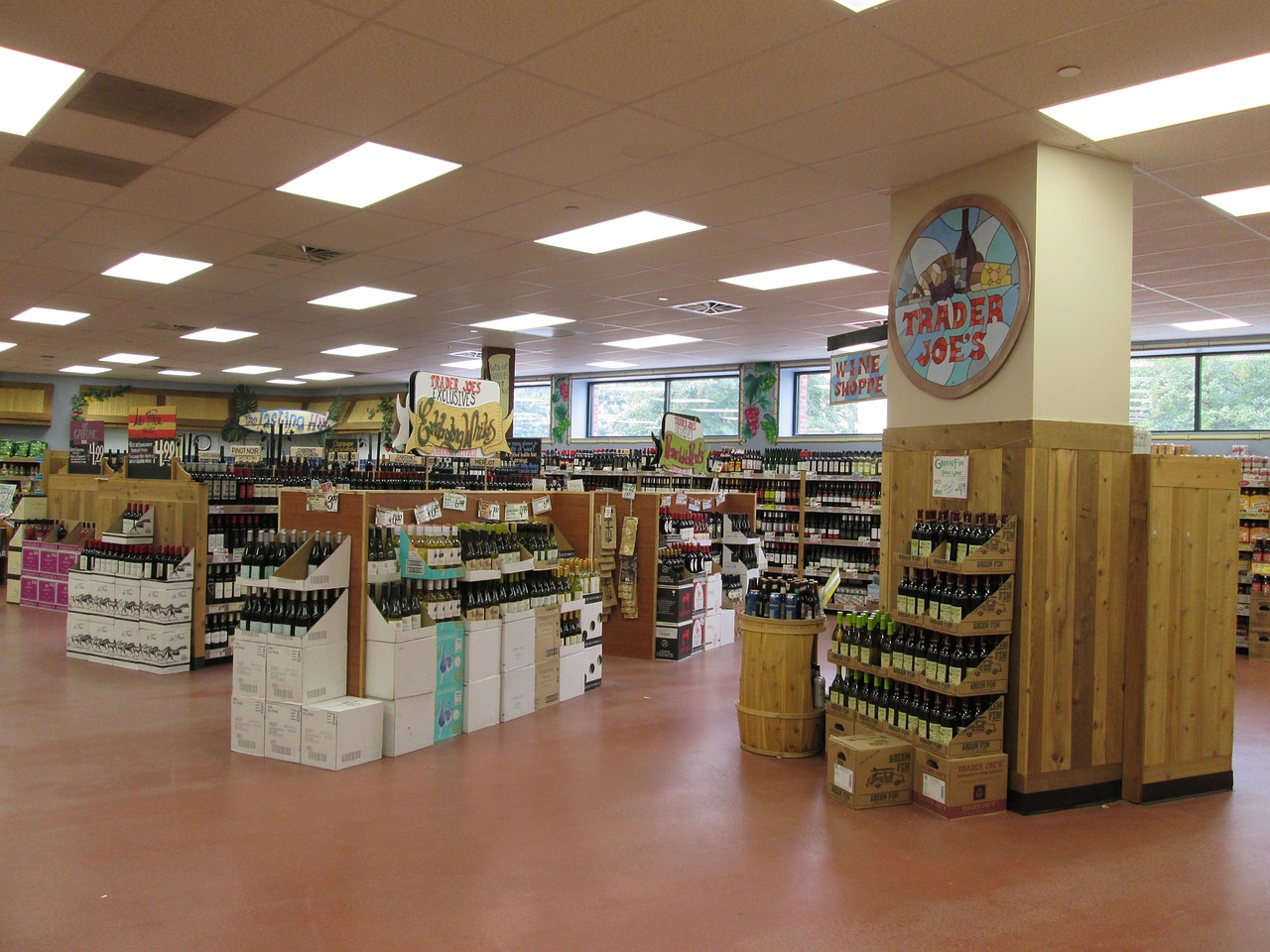Trader Joe’s is that unconventional grocery store with an extremely loyal following. Trader Joe’s offers a variety of affordable products that are hard to find in the larger grocery chains. The company was founded in 1967 with more than over 505 locations in the United States.
How much does it cost to open a Trader Joe’s? With such an impressive business operation, it’s only natural for many to inquire how to franchise a Trader Joe’s. Unfortunately, the company is privately owned and don’t offer any franchising opportunities at this time. Find an opportunity that fits your goals by completing our 7-minute franchise quiz.
Based on the industry average to start a medium sized grocery store, you can safely bet the total cost for the company to open a new Trader Joe’s location is between $1 – $2 million all in. Keep in mind these costs include real estate, shelves, shopping carts, legal documents, permits, insurance, initial inventory and other expenses associated with opening a new store.
But there is another a way you can work directly with Trader Joe’s as a vendor. If you’d like to get your food or personal care product sold on the shelves of this grocery store chain, it is an option. I explain how to become a vendor for the store below.
Below are more details and facts about Trader Joe’s that can help you understand more about this beloved business. I dive into the financial details and profitability of the company based on the data that’s out there so you understand what makes this grocery chain so unique and successful.
Page Contents
Financial Requirements and Fees
As mentioned above, Trader Joe’s does not allow franchising of its business so there’s no financial date available for potential operators. As mentioned earlier, if you’re still interested in doing business with the company, you can sign up to be a vendor.
Being a vendor at Trader Joe’s means that you’re an entrepreneur with products you would like to sell in their stores. Bear in mind that Trader Joe’s is strict when it comes to assessing your products. For instance, they only deal with the manufacturers directly. They also require the products to contain no artificial preservatives, artificial colors, added trans fat, MSG, genetically modified ingredients, and dairy ingredients made from rBST sources. A full list of these requirement details and other certifications can be found here.
Not Sure What Franchise to Start? Take Our 7-Minute Franchise Business Quiz!
As a Trader Joe’s fan myself, I can tell you they offer all sorts of unique food items in addition to some personal care items like soaps and lotions.
If you think you can meet their requirements, you may fill up their vendor form and then wait for their assessment or for them to get back to you.
Average Sales / Revenue per Year
Trader Joe’s has a revenue of $13.3 billion. They’re also reported in taking in more revenue at $2,000 per square foot in groceries which is more than any leading grocery store in the United States. According to reports, the company has more than 10,000 employees.
Trader Joe’s Franchise Facts
| Total Units | Over 500 |
| Incorporated Name | Trader Joe’s Co. |
| Franchising Since | Does Not Allow Franchising |
| Industry | Retail / Grocery |
| Subsector | Food and Beverage |
Trader Joe’s was known to have been founded back in 1967 but its history could be traced back to the late 1950s when it was once used to be known as a chain of convenience stores called Pronto Markets. Due to the tight competition the stores experienced against other rising convenience stores, the concept was changed along with the name to Trader Joe’s.
The name of the store comes from its founder Joe Coulombe. Trader Joe’s headquarters is in Monrovia, California and branches are located in over 42 states.
Franchise Review: What’s the Total Cost to Open a 7-Eleven? (w/ Fees + Profit)
They go by the tagline “Your Neighborhood Grocery Store” and take it to heart by offering products that are affordable. Most of the products they sell are also healthy. Trader Joe’s only keeps around 4,000 skus in stock as compared to the other stores that have around 38,900 items in stock. The choices they offer may not be a lot as compared to other grocery chains but that is done on purpose so customers aren’t overwhelmed with so many selections.
Another reason for this is because Trader Joe’s negotiates with their vendors to have the most affordable prices so customers are also able to save their money while shopping with them. Most grocery stores work through brokers or middle men to buy their products. Trader Joe’s, on the other hand, will only work directly with the manufacturers or farms of the product. By reducing the number of entities between the maker and seller, in many instances the company can reduce cost.
This is another reason you won’t see most of the items sold at Trader Joe’s at competitor concepts.
Trader Joe’s is also known for not hosting any sales nor do they give out coupons. They also don’t give out loyalty programs and membership cards. They deem all customers as equal and believe that they should have the best prices every day.
Trader Joe’s has over 10,000 employees and is known as the best company to work for in 2019.
How Much Does Trader Joe’s Make in Profit?
Being a private company, Trader Joe’s has managed to keep their numbers a secret so there’s not much known about how much they make in profit. But a revenue of $13.3 billion and ranked as part of the top grocery chains in the United States shows just how big the company got by keeping things small.
According to the Grocery Store Guy, the average profit margin for a grocery store is 2.2%. This is an industry with an extreme amount of profit margin and numerous fixed costs, including transportation, labor, and of course food. Assuming a profit margin if 2.2%, Trader Joe’s would have profited more than $292 million in a single year.
There are also plenty of experts that believe Trader Joe’s profit margin is well above the razor thin industry average. Even a single percentage point increase above the average grocery store profit would translate into more than $100 million in additional profit for the company.
Advantages of a Trader Joe’s Franchise
But what if, by some miracle, Trader Joe’s finally opened franchising and you were allowed to operate one? What are the advantages you can expect from this grocery chain? Let’s tackle a few points below.
Unique Store Items
Trader Joe’s is known for supplying its shelves with products that are not usually sold in big grocery stores. Most of their products are also branded with their label with unique names that have customers grabbing for it to try.
Products like Creamy Cauliflower Jalapeno Dip and Watermelon Fruit Spread aren’t something you see so often in grocery stores. They may also seem a little strange but that’s why people love visiting Trader Joe’s. Offering all these unique products to everyone is one of the reasons why people flock to this grocery chain so you can be sure there will always be something new at the grocery store.
Affordable
Trader Joe’s takes pride in having the most affordable products without skimping on the taste. A product like Two Buck Chuck which is a bottle of wine at $1.99 is a hit.
The company also strives to look for ways to have every product be as affordable as it can be. This is one of the strengths of Trader Joe’s which you can be proud of if ever you do get to operate one in your area.
Loyal Following
You don’t have to worry about advertising and marketing this grocery store to drive in sales and customers when everyone in the United States, and even abroad, already knows of Trader Joe’s. YouGov has ranked Trader Joe’s fifth on the grocery store ranks among competitors such as 7-Eleven and Whole Foods Market.
Challenges of a Trader Joe’s Franchise
Not everything in business is rainbows and butterflies. Even a popular and well-loved store like Trader Joe’s will have its ups and downs. Here are some of the challenges you can expect if ever you do get to operate one.
No Delivery Service
You might think that in this day and age Trader Joe’s might even consider a delivery option. Unfortunately, they don’t. So if you do decide to operate this chain, prepare yourself for the barrage of inquiries and requests as to how your customers can get their items delivered to their doorstep.
Related Reading: Can You Finally Open a Starbucks Franchise?
This could end up being a long-term strategic disadvantage for the company. This is especially true for people that don’t have access to a vehicle or are unable to leave their homes.
Discontinuation of Products
Trader Joe’s may discontinue a product if it’s not selling very well. Though that can be a reasonable business decision, some customers might complain about items they love no longer being sold. Trader Joe’s already has a limited variety and just imagine the heartbreak of some customers when they find out that their favorite nuggets have gone off the shelves forever. If too many of your favorite items are removed from a grocery store, you may ultimately decide to shop elsewhere.
No Sales
Customers love a good discount. But as mentioned above, Trader Joe’s doesn’t promote coupons or sales. I’m not a huge coupon clipper, but even I will head to a certain grocery store if they’re offering the right deal.
Though this isn’t such a big problem if you still have a loyal following flocking to your store, just imagine what more marketing and promotional stuff you can do to increase sales and foot traffic.
Of course there is a flip side to offering deep discounts on product. Discounts cut into the profitability of a product. As a result, sales like this can reduce the profitability of a store and contribute to the razor thing margins of the industry.
Is the Trader Joe’s Franchise Right For You?
If you’re passionate about running a business and have the experience, then a Trader Joe’s franchise could be for you. But as mentioned before, it’s not an option at this time. In the meantime, why not try looking for other options?
What is an alternative franchise?
If you’re still interested in a store chain, take a look at 7-Eleven. They have a one-time initial franchise fee that’s around $50,000 to $750,000 depending on the type of store you choose.
Has this guide helped you learn more about Trader Joe’s business? I hope so. Let me know in the comments below.




